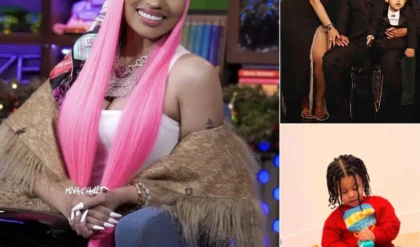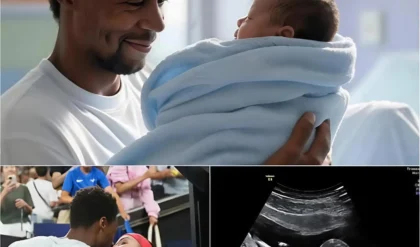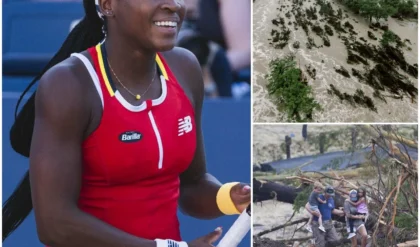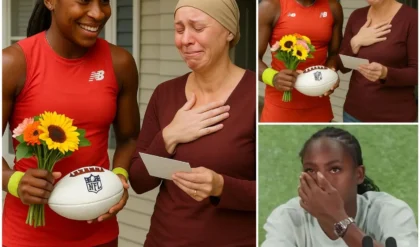The Resurgence of Old Wounds in Hip-Hop’s Most Notorious Feud
The longstanding feud between Cardi B and Nicki Minaj has taken another dramatic turn as fans of the Bronx rapper have begun calling out what they perceive as selective outrage from the Queen of Rap. The controversy stems from recently resurfaced threats and past incidents that fans argue demonstrate a clear double standard in how the two artists’ conflicts have been handled by both the public and authorities.

This latest chapter in their tumultuous relationship has reignited discussions about accountability, selective justice, and the way female rappers are treated differently when it comes to controversy. The debate has particularly focused on the FBI energy that some feel was notably absent when Cardi B faced similar situations, leading to accusations of bias and preferential treatment in the hip-hop community.
Historical Context of the Cardi B and Nicki Minaj Rivalry
The feud between these two powerhouse artists has been one of the most documented conflicts in recent hip-hop history. What began as subtle shade and indirect references has evolved into a full-blown rivalry that has captivated fans and dominated headlines for years. The roots of their conflict can be traced back to professional competition, with both artists vying for the crown of female rap supremacy in an industry that has historically only allowed room for one woman at the top.
Cardi B’s meteoric rise from reality television star to chart-topping rapper challenged the established order in female hip-hop, where Nicki Minaj had long reigned supreme. The tension became palpable as Cardi’s debut single “Bodak Yellow” climbed the charts and eventually dethroned several established artists, including tracks associated with Minaj’s circle. This professional rivalry quickly became personal, with both artists and their respective fan bases engaging in increasingly heated exchanges.
The most infamous physical manifestation of their feud occurred at the 2018 Harper’s Bazaar ICONS party, where Cardi B allegedly threw a shoe at Nicki Minaj during New York Fashion Week. The incident, which left Cardi with a visible bump on her forehead, marked a turning point in their relationship and demonstrated that their conflict had moved far beyond mere musical competition.
The Double Standard Debate
Cardi B fans, known as the Bardi Gang, have become increasingly vocal about what they perceive as unfair treatment of their favorite artist. They argue that when Cardi B has been involved in controversial situations or made threatening statements, she has faced immediate backlash, legal scrutiny, and calls for accountability. However, they contend that similar energy has not been applied when the shoe is on the other foot.
The selective outrage accusations center around the idea that Nicki Minaj has been afforded more leniency when it comes to her own controversial statements and actions. Fans point to various incidents throughout the years where they believe Minaj escaped the same level of criticism and consequence that Cardi B routinely faces. This perceived double standard has become a rallying cry for those who feel that bias exists in how the two artists are treated by media, fans, and even law enforcement.
The phrase “Where Was That FBI Energy When It Was Cardi on the Line?” has become a popular hashtag and talking point among Cardi’s supporters, referencing the perceived disparity in how seriously threats and controversies are taken depending on which artist is involved. This sentiment reflects a broader frustration with what fans see as inconsistent application of standards and consequences in the entertainment industry.
Social Media Warfare and Fan Base Dynamics
The modern landscape of celebrity feuds is largely played out on social media platforms, where fans can mobilize quickly and amplify their voices in ways that were impossible in previous generations. Both Cardi B and Nicki Minaj have massive followings across platforms like Twitter, Instagram, and TikTok, and their respective fan bases have become increasingly sophisticated in their ability to organize campaigns and apply pressure.
The Barbz, as Nicki Minaj’s fans are known, and the Bardi Gang have engaged in numerous online battles over the years, often escalating beyond typical fan disagreements into serious accusations and harassment campaigns. These digital battlegrounds have become extensions of the artists’ own conflicts, with fans feeling personally invested in defending their chosen side and attacking the opposition.
Recent developments have seen Cardi B’s supporters becoming more organized in their criticism of what they view as hypocritical behavior from both Minaj and her fan base. They have begun systematically documenting instances where they believe different standards have been applied, creating detailed threads and posts that aim to demonstrate the selective outrage they claim exists.
The Role of Law Enforcement and Legal Scrutiny
One of the most serious aspects of the selective outrage allegations involves the role of law enforcement and legal consequences. Cardi B has faced various legal challenges throughout her career, including charges related to a strip club altercation and other incidents that have resulted in court appearances and legal fees. Her fans argue that she has consistently been held accountable for her actions through the proper legal channels.
The FBI energy reference speaks to fans’ perception that when Cardi B has been involved in controversial situations, there has been swift action from authorities and serious investigation into her conduct. They contrast this with what they see as a more lenient approach when similar situations involve Nicki Minaj, questioning why the same level of law enforcement attention doesn’t seem to apply universally.
This disparity in legal scrutiny has become a central point of contention for those arguing that bias exists in how the two artists are treated. Fans point to various incidents over the years where they believe different standards of evidence, investigation, and consequence have been applied, depending on which artist was involved.
Industry Politics and Media Treatment
The entertainment industry has long been criticized for its treatment of female artists, particularly women of color, and the Cardi B-Nicki Minaj feud has become a case study in how media narratives can shape public perception. Fans of both artists have noted how selective reporting and emphasis can create vastly different stories from the same set of facts.
Cardi B’s supporters argue that their artist has consistently been portrayed more harshly in media coverage, with her actions and statements subjected to greater scrutiny and criticism than those of her rival. They point to headlines, story angles, and the tone of coverage as evidence of media bias that contributes to the broader pattern of selective outrage they claim exists.
The role of industry politics cannot be understated in this discussion. Both artists represent significant financial interests, with major record labels, streaming platforms, and corporate partnerships all having stakes in how these conflicts play out. The way these business relationships influence coverage and consequences has become another layer of the double standard debate.
The Broader Implications for Female Artists
This controversy extends beyond just two individual artists and speaks to broader issues affecting women in hip-hop and the entertainment industry as a whole. The concept of selective outrage that Cardi B fans are highlighting reflects systemic issues about how female artists are treated differently from their male counterparts and how competition between women is often sensationalized in ways that male rivalries are not.
The “only room for one” mentality that has historically plagued female hip-hop has created an environment where conflicts between women are treated as more significant and consequential than similar disputes between male artists. This dynamic has contributed to the intense scrutiny both Cardi B and Nicki Minaj face, though fans argue this scrutiny is not applied equally.
The discussion about FBI energy and legal consequences also raises questions about how authority figures and law enforcement view threats and conflicts involving female artists compared to male artists. The gendered aspects of how these situations are handled have become an important part of the conversation about fairness and equal treatment in the industry.
Current State of the Feud and Future Implications
As this latest chapter in the Cardi B-Nicki Minaj saga continues to unfold, the focus on selective outrage represents a new phase in how fans and observers are analyzing their conflict. Rather than simply taking sides in individual incidents, there is now a more systematic examination of patterns and double standards that may have influenced how each artist has been treated over time.
The accountability that fans are demanding extends beyond just the artists themselves to include media outlets, law enforcement, industry executives, and even fan communities that may have contributed to unequal treatment. This more sophisticated approach to analyzing celebrity conflicts reflects a broader cultural shift toward examining systemic bias and preferential treatment in all areas of society.

The long-term implications of this selective outrage debate could significantly impact how future conflicts between artists are handled and covered. If fans succeed in demonstrating that bias has influenced how Cardi B and Nicki Minaj have been treated, it could lead to changes in how media outlets cover celebrity feuds and how authorities respond to threats and conflicts in the entertainment industry.
Conclusion: The Fight for Equal Standards
The current controversy surrounding selective outrage in the Cardi B-Nicki Minaj feud represents more than just another chapter in their ongoing rivalry. It reflects a growing awareness among fans and observers that double standards and bias may have played significant roles in shaping how these conflicts have been handled and perceived.
The question “Where Was That FBI Energy When It Was Cardi on the Line?” has become more than just a rallying cry for frustrated fans; it has become a serious inquiry into how equal treatment and accountability are applied in the entertainment industry. As this debate continues to evolve, it may force important conversations about fairness, justice, and the way female artists are treated in hip-hop culture.
Whether this latest development will lead to any meaningful changes remains to be seen, but the organized and systematic way that Cardi B’s fans are approaching their criticism suggests that the days of simply accepting selective outrage and unequal treatment may be coming to an end. The fight for equal standards in how female artists are treated has found a powerful voice in this controversy, and its impact may extend far beyond just these two particular artists.





